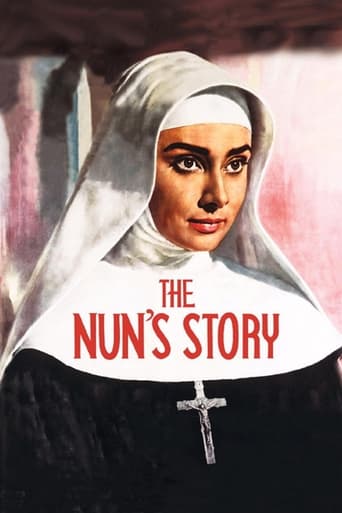SnoopyStyle
Around 1930 in Belgium, Gabrielle Van Der Mal (Audrey Hepburn) leaves her wealthy family to join the convent. Her surgeon father tries to dissuade her but she aims to be a healer in the Congo. She is given the name Sister Luke as she faces the challenges of her faith in the real world. Her nemesis is her pride. First, she's denied the Congo but eventually, she is assigned there to work under Dr. Fortunati (Peter Finch).Based upon the life of Marie Louise Habets, it was nominated for 8 Oscars winning none. It is certainly detailed in its portrayal of a nun's life. It's the film debut of Colleen Dewhurst in a minor role. Each part is interesting but the movie needs a driving force through the entire story. That is supposed to be her pride but it comes and goes at times. That idea needs some repetitive clarity as a lens to focus her character development. It is sometimes colored with a suggested love story with Fortunati. Her obsession with the Congo needs to be given voice. It would be great if she actually says out loud that she is better than the other nuns. Her struggles with her obedience is generally good. The most compelling scene is the leper colony with real lepers. The Nazi occupation could have been more dramatic although this movie treats it more as an interior struggle. It stops her story short. I understand the concept of stopping at that point but I need to see her life afterwards.
Robert J. Maxwell
Belgium, 1930. Audrey Hepburn, daughter of a famous surgeon (Jagger), joins a convent, undergoes a rigorous training in humiliation, becomes a star pupil at the school for tropical medicine, is sent to what was then called the Belgian Congo where she becomes an indispensable surgical assistant, has an emotional but strictly Platonic brush with the demanding and non-believing doctor (Finch), is sent back to Belgium against her wishes, and resigns from the order.Several scenes seemed especially instructive. First, the whole business of going through boot camp at the nunnery was an excellent example of initiation rituals as they're found around the world. I won't go into details but being given a new name is a common feature of these rites of passage. Gabrielle van der Mal becomes Sister Luke. In our society we have confirmation names, Hebrew names, and nicknames given during service in the Marine Corps.Second, Hepburn is doing first rate work at the school for tropical medicine. She's intelligent, a nurse, and the daughter of a surgeon. But she's breaking some of the rules as well. She doesn't show enough HUMILIATION, so her superior asks her to fail the final exam as evidence that she's rid herself of the sin of false pride. Let's put it this way -- she's supposed to deprive the community of a skilled nurse with a specialty in tropical medicine to prove her subordination to the church.As capitalism developed, is it any wonder that Reformed Churches arose? The sociologist Max Weber made a convincing argument that it was the overthrow of Catholicism, with its vows of poverty and its denunciation of usury, that made capitalism possible. Not that one cause the other, but that they were concordant in their values. If Catholicism taught that being poor was a virtue, Protestantism taught that industry, thrift, and community work was in the service of God.That's a short and incomplete description of my point but please don't argue with me about it. I know what I'm talking about. I've been poor all my life.This is an exceptional movie in many ways. Audrey Hepburn is quite good as Sister Luke. She was always beautiful in a fey way, never sexy, and it fits the role perfectly because you hardly see anything except her facial features, and they're very expressive. She does a fine job.Peter Finch is good too but it's a common role -- the roguish male who challenges the suppressed female to come out of her shell. Viz., Cary Grant and Joan Fontaine in "Suspicion." Franz Waxman's score is carefully done. In a scene in which an almost unrecognizably young Coleen Dewhurst, as a madwoman, attacks Hepburn, the score is anything but bombastic, only plucked strings. Elsewhere the score is modest and appropriate to the occasion. We hear "ora pro nobis" which, when I was a kid at mass, I always heard as "O, Ropra, No Bis," because, not having had Latin, I couldn't identify junctures.Something has to be said about the cast too. What a lot of winners, including Dame Peggy Ashcroft who went from the wife of the suspicious farmer in "The 39 Steps" to the elderly Mrs. Moore in David Lean's "A Passage to India." And the art direction and set dressing. Nothing was every so clean as the nunnery through which Hepburn passes. Every surface is polished, immaculate, so to speak. Every piece of cloth is spotless and freshly pressed. The barracks in MY boot camp were never so clean.Aside from its rather obvious display of the cultish aspects of belonging to an order, it's a fine film, very tastefully directed by Fred Zinnemann -- so tasteful in fact that it's almost impossible to imagine its being made in today's Hollywood.
jarrodmcdonald-1
Director Fred Zinneman and actress Audrey Hepburn conspire to make a very belabored movie about a young woman entering and leaving the religious life in The Nun's Story. The film has a great premise and could have been a lot better. Some of the scenes drag on interminably. Every moment is so punctuated with purpose that the whole thing seems like a tedious affair. And Miss Hepburn is given very inconsequential dialogue. Mostly she nods and says 'yes' over and over in a flat monotone voice. As a Catholic, the story itself makes me unhappy, but as a cinemaddict, the story makes me even unhappier. The real problem is not that a life with God is one for her, but that the way in which the filmmakers tell it is so lifeless and un-entertaining. It's a pensive film about making a long drawn out mistake. The only good thing I can say about it is that Hepburn brings sincerity to the role. But she brought sincerity and good cheer to Roman Holiday and less socially conscious films.
secondtake
The Nun's Story (1959)I knew I would enjoy at least Audrey Hepburn, and she's fabulous. But the movie came on as a Christmas Day feature and I worried that it would have too many religious overtones. Then as the credits rolled I saw it was directed by Fred Zinnemann. Zinnemann? I wondered what would draw him to this kind of story. My expectations tripled.I was not disappointed. This is a measured but never slow movie. It's totally beautiful, it handles the sanctity of the convent with respect, never tipping into sappy adoration. Hepburn is what you want from her, lively and independent, and this is a natural conflict in a world of discipline and loss of independence. And it's also an evolving, changing story with a couple of major twists as it goes. By the end you see very much why Zinnemann wanted to do this and I can't tell you that. See for yourself.The conflict between self and community, between having your own opinion about something and being forced to follow a larger set of rules that might not always be best, is the core of the film. When do you rebel? When do you submit? And if you have agreed beforehand to devote your life to submission, do circumstances allow an exception? A total change of heart?If you think this sounds boring it is not. You might give Hepburn the biggest credit here--she's a natural and you are nothing but sympathetic--but the directing the cinematography are huge, as well. Behind the camera is Franz Planar, who did such trifles as "Holiday" and "Letter from an Unknown Woman" as well as two Audrey Hepburn movies "Roman Holiday" and "Breakfast at Tiffany's." If you have seen any of these (or all) you'll know how really perfectly they are filmed, with the camera in service to the story.The story, by the say, in "The Nun's Story" is very much the point, even beyond the moral. When does a young woman leave a loving and comfortable home and join a convent, face a loss of self and freedom, and yet still feel useful to the world? Hepburn's character (who changes names, in part of the effort to leave the past behind), wants to go to Africa to serve the needy. How this is thwarted--or not--you'll see, but you really root for her. You see her brush against her principles in every way. And you see a larger principle arise--do the right thing. And she does. It's beautiful. It ought to make you cry. It will easily engage and move you.




